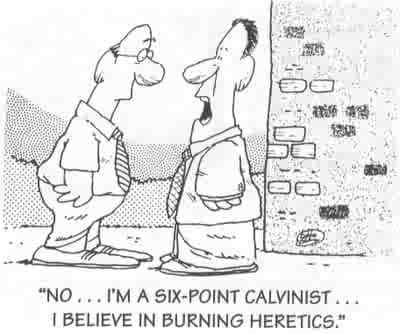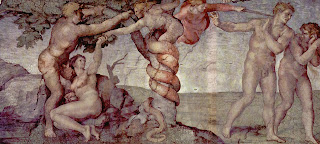Part 1 - Hyper Drivel
 |
| Don't matter. Either Jesus died for you or not. |
3. Teaching a universal atonement reduces the wisdom of God to foolishness.
I'm not sure what he's trying to say here, unless it's that Christ couldn't possibly die for everyone because God is omniscient and His plan is always perfect. Thus, since God elected some persons, that means Christ simply couldn't have died for those whom the Father did not elect. This stance is based on the Reformed doctrine of the Pactum Salutis, also known as the Covenant of Redemption. This is a pre-creative covenant in which the Father, the Son, and the Spirit make a covenant to carry out the plan of redemption. In short, the Father elects people, the Son comes and atones for them, and then the Spirit regenerates them in due time.
| Mr. T pities you, Pr. Fortner. |
In this case, the Calvinistic rationalism has gotten the best of Pr. Fortner. Instead of simply turning to Holy Scripture and believing what is written, he instead decides to erect emotional arguments against the traditional and proper Christian stance of universal atonement. So you disagree with it, we get that. You're entitled to be wrong and to be a hyper Calvinist. But really, "universal atonement reduces the wisdom of God to foolishness?" Come on, you can do better. Which you actually did in #4.
4. Teaching a universal atonement is a denial of the justice of God.
This is a tougher one to deal with. Why is this so? Because this is the classic Calvinist "double jeopardy" argument. It goes something like this: If Christ paid for a person's sins, then that person cannot go to hell, because that would make God unjust for punishing that person's sins twice - once on Christ and then again on them.
But...what if a person rejects Christ? What if they despise the Lamb who died for them? Then what? The Calvinist says this is not possible. Scripture says otherwise.
The double jeopardy argument makes a lot of logical sense but in the end it's nothing more than an unnecessary logical leap that is not required by the text of Holy Scripture. Mainly, because it ends up denying Holy Scripture in some places, and that's just not good.
5. Teaching a universal atonement reduces the omnipotence of almighty God to impotence weaker than the will of man!
Yeah, if you're talking about Pelagianism, sure. I can get on board with this criticism if it's aimed in that direction and in that direction only.
To be succinct, a universal atonement in itself does not lead to those conclusions. Sorry, Pr. Fortner, you've made a false argument here.
Lutheranism teaches a universal atonement. But we're also monergists and God's saving grace actually saves in Lutheranism.
6. Teaching a universal atonement asserts that the immutable God is, after all, fickle, mutable, and changeable.
Uh...no it doesn't. Pr. Fortner here again makes a leap of logic and connects God's foreknowledge or foreordination with the atonement and surmises something like this:
God ordained everything.
God elected the elect and no one else.
Therefore, Christ only died for them and no one else.
Or else He's not immutable. And stuff.
Sorry, but the argument doesn't flow and is unscriptural to boot. God is immutable. Truth. Christ died for everyone. Truth. Believe it, it's just Scripture.
7. Teaching a universal atonement robs God of his glory in salvation.
You see where these arguments all head to? They're aimed at free-will theologies and synergism. All of them. Of course, this makes every argument Pr. Fortner erects false, because universal atonement does not require synergism. His sermon would be better off aimed at Pelagianism or Semi-Pelagianism, not universal atonement.
So, does universal atonement rob God of His glory in salvation? No, not at all.It grounds salvation -all of it- in the work of Christ alone. It also grounds condemnation -all of it- in man alone.
Hmm...isn't that what Lutheranism teaches? Yeah, thought so.
8. Teaching a universal atonement denies the satisfaction of Christ.
No, no, no it doesn't. What denies the satisfaction of Christ is adding something to His work. Of course, the high Calvinist defaults back to Owen's trilemma (see first post) here.
We teach that the atonement in itself is sufficient and effective for everyone universally. It must be given to you through Word and Sacrament to be received by faith alone, however.
The high Calvinist counters that it is Christ's death plus nothing that brings the elect and only the elect to faith and repentance. We agree here for the most part. Christ's death saves. Plus zero. But it must be received. You know, by Holy Baptism, the preaching of the Gospel, and the true body and blood of Christ in the Sacrament of the Altar. And stuff.
The high Calvinist ultimately cuts out the means of grace as effectual; making grace completely unmediated, or only sometimes mediated - but only to the elect. It also raises questions about justification by faith alone.
9. Teaching a universal atonement affirms that there are multitudes in hell for whom the Lord Jesus Christ died in vain!
Yes, there are multitudes in hell for whom Christ died. That does not make His death in vain. That argument has always fallen on deaf ears to this guy, even as a Calvinist. It's sort of a silly canard based on emotion again.
Anyways, those are my extremely limited thoughts on Fortner's #3-9 reasons. Most of his arguments are aimed at Pelagians, not universal atonement. Unless he's a sheer rationalist...
Oh wait...












